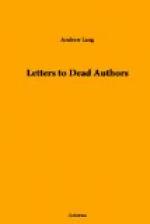On the other hand, Time is at last beginning to sift the true admirers of Dickens from the false. Yours, Sir, in the best sense of the word, is a popular success, a popular reputation. For example, I know that, in a remote and even Pictish part of this kingdom, a rural household, humble and under the shadow of a sorrow inevitably approaching, has found in ‘David Copperfield’ oblivion of winter, of sorrow, and of sickness. On the other hand, people are now picking up heart to say that ‘they cannot read Dickens,’ and that they particularly detest ‘Pickwick.’ I believe it was young ladies who first had the courage of their convictions in this respect. ‘Tout sied aux belles,’ and the fair, in the confidence of youth, often venture on remarkable confessions. In your ‘Natural History of Young Ladies’ I do not remember that you describe the Humorous Young Lady (1). She is a very rare bird indeed, and humour generally is at a deplorably low level in England.
(1) I am informed that the Natural History of Young Ladies is attributed, by some writers, to another philosopher, the author of The Art of Pluck.
Hence come all sorts of mischief, arisen since you left us; and, it may be said, that inordinate philanthropy, genteel sympathy with Irish murder and arson, Societies for Badgering the Poor, Esoteric Buddhism, and a score of other plagues, including what was once called Aestheticism, are all, primarily, due to want of humour. People discuss, with the gravest faces, matters which properly should only be stated as the wildest paradoxes. It naturally follows that, in a period almost destitute of humour, many respectable persons ‘cannot read Dickens,’ and are not ashamed to glory in their shame. We ought not to be angry with others for their misfortunes; and yet when one meets the cre’tins who boast that they cannot read Dickens, one certainly does feel much as Mr. Samuel Weller felt when he encountered Mr. Job Trotter.




